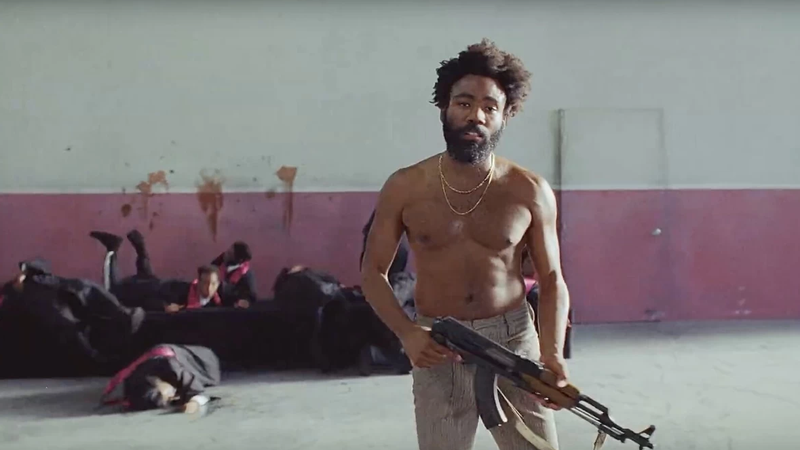‘This Is America’ Actor Talks Donald Glover, Easter Eggs and Trayvon Martin’s Dad
“I hope he never sees it,” Calvin the Second says of Childish Gambino video

'This Is America' actor Calvin the Second offered us an inside look at Childish Gambino's controversial video.
Musician-actor Calvin the Second was spending a weekend at Coachella when his agent gave him a call. A new music video was looking for a black guitarist, and the multi-instrumentalist who had appeared in films like Whiplash and shows like Nashville fit the bill.
Still, he was a bit surprised when the agent offered up a bit more details on the clip.
“They want to put a bag over your head and shoot you,” he recalls off her description.
After another call with one the video’s producers, the guitarist drove back to Los Angeles to appear in Childish Gambino’s “This Is America,” a powerful, striking reflection on gun violence, distraction and blackness that Donald Glover debuted during his appearance as both host and musical guest on Saturday Night Live.
The waves caused by the visceral, shocking clip were immediate, making it one of the year’s most important cultural moments already. Critics, fans and fellow filmmakers picked apart the Jim Crow imagery, characters, facial expressions and more from every scene. The guest appearance of rappers like 21 Savage, Young Thug and Blocboy JB ”” who are credited on the song’s various ad libs ”” added another layer worth dissecting, pointing to the ways entertainment can distract and desensitize as well as the ways these artists have discussed gun violence in their own music.
Before shooting the clip, Calvin was already sold on the minimal descriptions he had been given. The producer played “This Is America” over the phone and let him know exactly what was expected of him that day. “At the onset, I thought it was going to be a lot more graphic and dramatic than it ended up being,” he tells Rolling Stone. “In my mind, I’m thinking: horror film.”
As a fan of both Gambino’s music and Glover’s film/television career, Calvin the Second trusted the vision. On set, he was immediately blown away by the production level and direction of Hiro Murai. The final product is a multi-layered, fast-paced piece of storytelling that demands constant attention on Glover as numerous, action-packed moments occur in the background.
“The Easter Eggs started immediately,” he notes, specifically calling out the brief SZA cameo where the singer is seen lounging on a car as the shot widens. “We both had just come from Coachella. She was probably riding beside me on the highway like ‘Oh, who’s that guy with the beard.'”

As an artist himself, he was happy to not know much about Glover and director Murai’s motivations behind the video.
“If an artist explains everything that they meant, it waters down the message,” he says. The video has been interpreted and re-interpreted countlessly in the days since its release, and a Twitter rumor that confused Calvin the Second for Trayvon Martin’s father Tracy made some readings of the clip even more charged than intended.
“I felt bad for him!” he notes. The beginnings of the rumor are hard to trace, though Calvin believes it picked up steam because of a tweet sent out by Dear White People creator Justin Simien. The musician was quick to disprove the rumors, as were his friends and fans who tried to keep it from spreading further.
“I’m not upset that people on Twitter thought I might be [Tracy Martin],” he reverently adds. After a few days of reflection, he’s become upset that the claims existed in the first place and hopes that it doesn’t cause unnecessary stress in Martin’s life.
“That man’s life has been severely altered by gun violence, and now he gets to see more?” he says, referring to a scenario where Martin is approached in public and congratulated for his non-appearance in the music video. “I hope he never sees it.”
Beyond the surreal moment of mass Internet confusion, Calvin the Second is grateful for the opportunity. It has led to many people discovering his music for the first time, and he hopes that it will build momentum as he prepares to launch a crowdfunding campaign for a forthcoming single. “I would be honored,” he says, “to say that ‘This Is America’ is what really broke me.”



